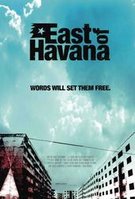
“Hip Hop is struggle. It means a determined attitude towards life. It means rebellion. . . For me it means freedom.”—Cuban Rapper Soandres “Soandry” Del Rio Ferrer
Looking for a Hip Hop scene where nobody wears Che t-shirts? Then check out East of Havana, the new Cuban Hip Hop documentary opening today at the IFC Film Center in New York (previewed here, trailer here). Produced by Charlize Theron, it follows three young Cuban rappers as they prepare for their performance in Cuba’s international Hip Hop festival.
Like jazz in Soviet-dominated Eastern Europe, Hip Hop in Cuba exists in a precarious position. Formerly outlawed, the music has only recently been officially sanctioned due to the intercession of Castro’s close friend, Harry Belafonte. The three young artists of East, work almost entirely outside of the official system, as members of their own independent collective, El Cartel, and their music speaks of their dissatisfaction with the current system.
East shows the abject poverty of Havana under Castro’s dictatorship. The living conditions filmed would be considered sub-standard in most third world nations. At one point, one of the young rapper’s mother tellingly jokes about cooking entire meals from three garlic cloves. We see rapper Magyori eek out a survival selling anything, including the proverbial shirt off her back, to maintain a hand-to-mouth existence. Some reviews have tried to interpret these images as an indictment of the American embargo, but that seems a rather desperate spin, especially given the amount of European trade and tourism coming into the prison island.
Indeed, nobody is heard waxing poetic about the healthcare or education of the bearded regime. They are worried about where their next meal will come from, and finding outlets for the art and self-expression—pretty fundamental stuff. We see Soandry’s brother in America, wracked with guilt for leaving his family. Yet his younger brother harbors no bitterness. He tells his interviewer one has to leave the country to think freely, so he well understands his brother’s choice. It is clear the privations of Cuba are not just economic in nature.
East is not perfect. To be truthful, even at 82 minutes, the film does have pacing issues. However to their credit, the young rappers acquit themselves well. Granted, I don’t follow American Hip Hop closely, but their music actually compares favorably to what I’ve heard here recently. Paul Heck’s incidental soundtrack also has a pleasing vibe.
From the press materials, it is clear, the filmmakers wanted to tread a middle road, but the harsh reality captured by their lenses speaks volumes. It’s worth checking out.